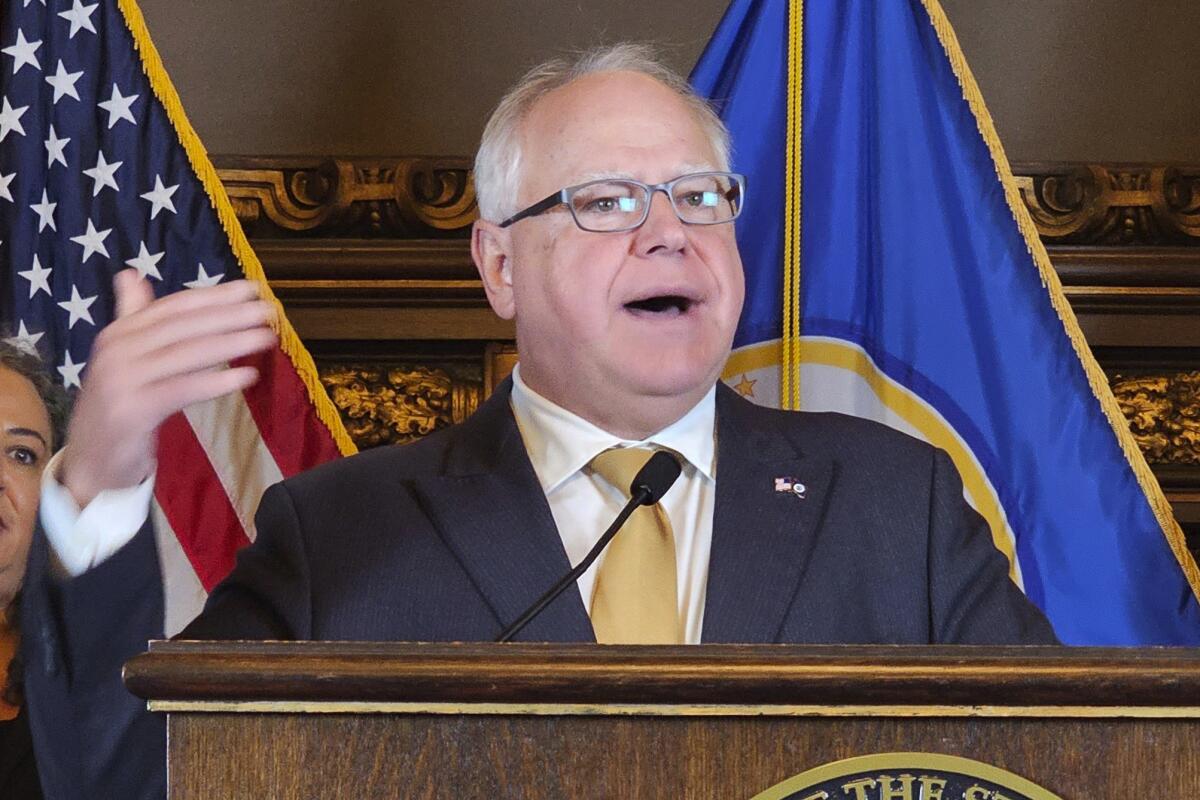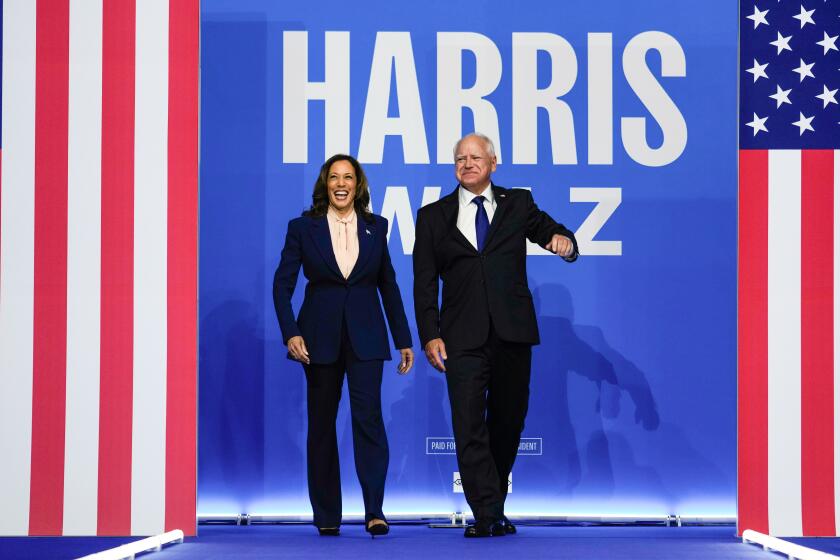Opinion: Tim Walz is Kamala Harrisâ running mate. Will he help her win in November?

On Tuesday, Kamala Harris made her choice for the next vice president of the United States: Gov. Tim Walz of Minnesota. The question is, will this make voters more likely to choose Harris for president in November?
In short: Probably so, but not by much and perhaps not for the reasons you think.
Kamala Harris has selected Minnesota Gov. Tim Walz as her running mate. The moderate Democrat demonstrated the ability to work with Republicans when he was in Congress.
Many people assume that the vice presidential pick will be an electoral game changer. Itâs a common mistake: Conventional wisdom has told them that a good one can boost the ticket by several points â and a bad one can sink the campaign. But weâve spent more than a decade studying candidates for vice president, and our research shows that votersâ opinions of running mates do not have much direct effect on presidential voting.
Even if Walz proves to be quite popular with the American people â or quite unpopular, as Donald Trumpâs running mate, JD Vance, has so far proved to be â that in itself wonât change many votes. The fact is, voters are electing a president of the United States first and foremost. Yes, theyâre electing a vice president too, but that is much less important to them.
Another common misconception is that a running mate will âdeliverâ his or her stateâs electoral votes for the presidential candidate. It is probably no coincidence that many of the finalists for Harrisâ ticket came from electorally competitive states â including Walz. But our research found there is very little evidence of a âhome state advantageâ for running mates. On average, the effect is close to zero. This makes us skeptical that adding Walz to the ticket somehow guarantees that Democrats will win Minnesota or other competitive Midwestern states.
By dismissing Donald Trump and J.D. Vance as âweird,â the Democrats have defanged Republicansâ campaign of fear â and started to drive GOP leaders crazy.
Walz wouldnât be to blame for failing to deliver a decisive electoral advantage â nor would Vance, for that matter. Voters just donât care about running mates quite that much. But the person at the bottom of the ticket can help at the margins, and for good reason: The choice of a vice president tells voters something important about the person running for president.
In the case of Harris, this âfirst presidential actâ tells voters a lot. Americans donât know her as well as they do Joe Biden or Trump, and she has significantly less time than most presidential candidates to make her case. Her choice will help voters assess her judgment. It also helps them determine whether she makes responsible decisions, for the good of the country, or acts irresponsibly to achieve short-term political gain. It tells people what core political values and priorities guide her.
By picking Walz, Harris has chosen a vice president who is well-qualified for the job. The two-term governor previously served six terms in Congress, where he was the ranking member of the House Veteransâ Affairs Committee. Among Harrisâ finalists, he is the only one to have served in state and federal office. Walzâs combination of executive and foreign policy experience â plus his 24 years of service in the Army National Guard â distinguishes him as a plausible âsecond in commandâ in a Harris White House.
J.D. Vanceâs âcat ladyâ missteps have the former president defending and explaining, and in politics, if youâre explaining, youâre losing.
Voters are likely to reward Harris for choosing a credible potential vice president (and president). In fact, according to our research, this is votersâ most important criterion when evaluating a vice presidential pick. Meeting this test improves votersâ opinions of a presidential candidateâs judgment, which in turn gains them votes.
The opposite is also true. Take the 2008 election, for example. Our analysis showed that voters who doubted Sarah Palinâs readiness to be president lost confidence in John McCainâs judgment and became less likely to vote for the Republican ticket. Conversely, Barack Obamaâs selection of Biden â a senator with decades more experience than he had â increased confidence in his acumen and delivered votes to the Democratic ticket. If voters likewise believe that Walz is White House material, he could help Harris win the election.
The choice could also benefit Democrats by reassuring their partyâs progressive base of support. Harris was once rated the most liberal member of the Senate, and voters see her as more liberal than Biden. But during the 2020 presidential primaries she was challenged from the left, particularly on her record as a prosecutor and attorney general, and the Biden administration has often faced resistance from more progressive elements of the Democratic Party.
Our research shows that Bidenâs selection of Harris for vice president shifted perceptions of his ideology to the left. Walzâs selection could also help frame Harrisâ ideology, by reassuring Democrats of her progressive bona fides without alienating more moderate voters. While Walz has governed Minnesota as a progressive, in Congress he represented a Republican-leaning district and was known as a relative moderate.
Voters will determine in November whether Harris made the right decision. For now, we can rely only on evidence from past elections to evaluate her choice. That information suggests we should not expect Walz (or Vance) to be the deciding factor in the election. But if â as we suspect â voters see Walz as a credible potential vice president who can help Harris advance her legislative agenda, he may help her reach the Oval Office.
Christopher J. Devine is an associate professor of political science at the University of Dayton. Kyle C. Kopko is an adjunct professor of political science at Elizabethtown College. Their most recent book is âDo Running Mates Matter? The Influence of Vice Presidential Candidates in Presidential Elections.â
More to Read
A cure for the common opinion
Get thought-provoking perspectives with our weekly newsletter.
You may occasionally receive promotional content from the Los Angeles Times.













